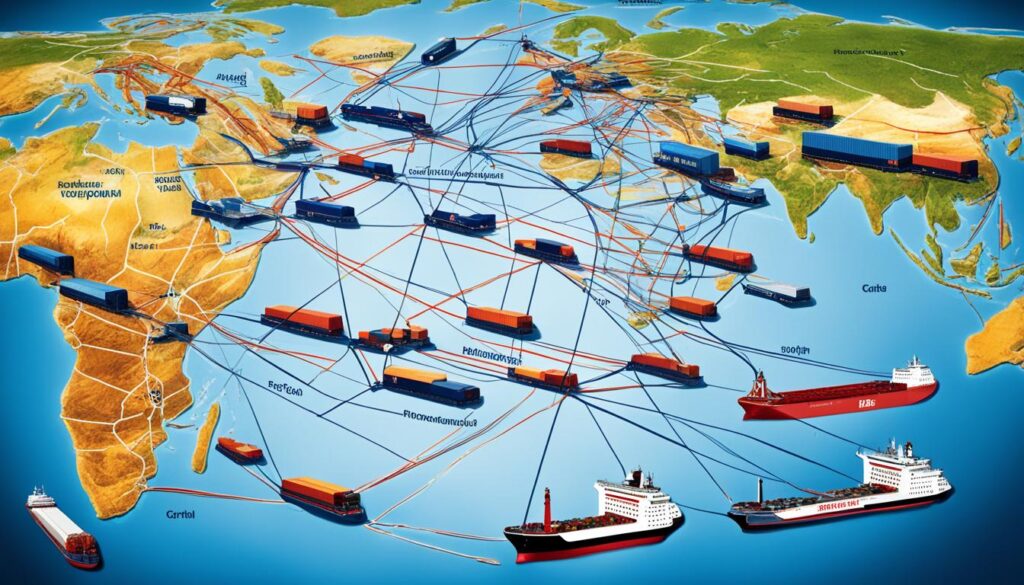Hi! Today, I’ll share the interesting link between political instability and foreign investments. Countries worldwide are trying to attract foreign direct investment (FDI). They want to boost their economies. But, the political stability of a country is key to its success.
Political instability involves civil unrest, frequent changes in leadership, or unpredictable policies. This makes it hard for a country to draw in foreign investment. Investors look for places that are stable. They want to know what to expect in terms of policies and governance.
Studies show that areas like Asia-Pacific, Eastern Europe, and South/Southeast Asia face political instability. This affects their FDI. By looking at these studies, we can learn a lot about how political stability is crucial for attracting foreign investments.
Key Takeaways:
- Political instability can make it tough for foreign investments to come in. It creates a challenging business atmosphere.
- Places like Asia-Pacific, Eastern Europe, and South/Southeast Asia have felt the effects of political instability on FDI.
- Investors prefer places that are stable, with clear policies and open governance systems.
- Research gives us a deep understanding of how political stability is important for foreign investments.
- Stay tuned to learn more exciting things about how political stability and foreign direct investments are connected.
The Relationship Between Trade Openness and FDI
Welcome to the second section of our article. Here, we’ll look at how trade openness and foreign direct investment (FDI) connect. Trade openness shows how much a country trades with others and encourages trading across borders. FDI means foreign companies invest in another country’s economy.
So, what’s the effect of trade openness on FDI? Let’s find out.
“Trade openness acts as a catalyst for attracting foreign direct investment, often leading to significant economic growth and development.”
Countries that are more open to trade often attract more FDI. This happens because an open trade environment is good for foreign investors. Fewer trade barriers make a country appealing for companies to grow and reach new markets.
Indeed, research shows trade openness boosts FDI. This leads to more jobs and economic growth. This link is seen worldwide, benefiting various regions.
Trade Openness and FDI in Asia-Pacific
In Asia-Pacific, places like Singapore and Hong Kong love trade openness. They draw in lots of FDI, leading to growth. Singapore, for example, has become a top business spot thanks to its open trade.
Trade Openness and FDI in Eastern Europe
In Eastern Europe, countries like Poland and Hungary see benefits from trade openness, too. They’ve made their business settings better, pulling in big investments. Companies see these as new markets to enter.
Image: An illustration representing trade openness and its impact on FDI inflows.
Trade Openness and Economic Growth
Trade openness doesn’t just bring in FDI; it also helps the economy grow. Trading internationally exposes local industries to the world, pushing them to innovate. This leads to better jobs and living standards.
It also lets countries focus on what they do best. This helps use resources well and expand the economy.
In essence, trade openness and FDI benefit each other. Countries that encourage trade and a welcoming business climate attract foreign investments. This sparks economic growth and job creation.
Next, let’s look at how good governance draws in FDI and boosts the economy. Stay with us for this interesting topic.
The Role of Institutional Quality in FDI Inflows
Institutional quality is pivotal in drawing foreign direct investment (FDI). Good governance, clarity, and a robust regulatory scene are key. I’ll explore why institutional quality is crucial for attracting foreign investment here.
Institutional quality means how effective and honest a country’s institutions are. This includes political stability, rules, law adherence, and openness. These elements make a country business-friendly and secure for investors.
A study on FDI in South Asian and Southeast Asian countries showed good governance attracts foreign investment. Countries with better institutional quality got more FDI. This tells us investors favor countries with solid, transparent institutions.
Political stability matters a lot for institutional quality. Countries with steady politics attract more foreign investors. A stable political scene gives investors confidence by lowering the risk of unexpected policy shifts.
“Good governance and institutional quality are vital for attracting foreign direct investment. Countries focusing on clarity, law observance, and a strong regulatory setup gain more from FDI.”
A clear and effective regulatory setting is also crucial. A fair regulatory framework makes doing business and pulling in foreign investment easier. Investors look for countries with transparent regulations that protect and treat everyone equally.
Law jurisdiction is pivotal for FDI too. Countries with solid law jurisdiction offer a legal setup that respects property rights and contract laws. This draws foreign investors, as they feel their rights are secure.
Corruption also affects institutional quality. Countries seen as corrupt are risky for investors. But, nations with minimal corruption draw more FDI as they seem reliable and fair for business.
In summary, institutional quality’s role in attracting FDI is undeniable. Nations valuing good governance, clarity, and strong regulations get more FDI. By improving institutional standards, countries can become more enticing for foreign investors, boosting growth and development.
Comparison of Institutional Quality Scores in Southeast Asian Countries
| Country | Institutional Quality Score |
|---|---|
| Singapore | 9.6 |
| Malaysia | 7.3 |
| Thailand | 6.5 |
| Indonesia | 5.8 |
| Philippines | 4.9 |
Conclusion
In conclusion, political instability greatly affects foreign investment. It can make nations less appealing to investors. This leads to fewer investments and slows down economic progress.
The effects of instability on investment are big. Nations with unstable politics struggle to keep a good business environment. This makes it hard to bring in and keep foreign investors.
Yet, some key factors can fight the issues caused by instability. Trade openness, institutional quality, and good governance help bring in investment and grow the economy. Policymakers need to focus on these areas. They should work on clear laws, improve institutions, and ensure good management.
To sum up, tackling political instability is vital for foreign direct investment. A stable and welcoming environment is key for attracting investors. This will lead to economic growth and lasting progress.
FAQ
What is the impact of political instability on foreign investments?
How does trade openness affect foreign direct investment (FDI)?
What is the role of institutional quality in attracting FDI?
What are the implications of political instability for attracting and retaining foreign direct investment?
Source Links
- https://www.nature.com/articles/s41599-023-02075-1
- https://unece.org/fileadmin/DAM/ead/sem/sem2005/papers/FDIUNECE1.pdf
- https://www.sciencedirect.com/science/article/pii/0305750X85900026
Disclaimer
All information on this website is of a general nature. The information is not adapted to conditions that are specific to your person or entity. The information provided can not be considered as personal, professional or legal advice or investment advice to the user.
This website and all information is intended for educational purposes only and does not give financial advice. Signal Mastermind Signals is not a service to provide legal and financial advice; any information provided here is only the personal opinion of the author (not advice or financial advice in any sense, and in the sense of any act, ordinance or law of any country) and must not be used for financial activities. Signal Mastermind Signals does not offer, operate or provide financial, brokerage, commercial or investment services and is not a financial advisor. Rather, Signal Mastermind Signals is an educational site and a platform for exchanging Forex information. Whenever information is disclosed, whether express or implied, about profit or revenue, it is not a guarantee. No method or trading system ensures that it will generate a profit, so always remember that trade can lead to a loss. Trading responsibility, whether resulting in profits or losses, is yours and you must agree not to hold Signal Mastermind Signals or other information providers that are responsible in any way whatsoever. The use of the system means that the user accepts Disclaimer and Terms of Use.
Signal Mastermind Signals is not represented as a registered investment consultant or brokerage dealer nor offers to buy or sell any of the financial instruments mentioned in the service offered.
While Signal Mastermind Signals believes that the content provided is accurate, there are no explicit or implied warranties of accuracy. The information provided is believed to be reliable; Signal Mastermind Signals does not guarantee the accuracy or completeness of the information provided. Third parties refer to Signal Mastermind Signals to provide technology and information if a third party fails, and then there is a risk that the information may be delayed or not delivered at all.
All information and comments contained on this website, including but not limited to, opinions, analyzes, news, prices, research, and general, do not constitute investment advice or an invitation to buy or sell any type of instrument. Signal Mastermind Signals assumes no responsibility for any loss or damage that may result, directly or indirectly, from the use or dependence on such information.
All information contained on this web site is a personal opinion or belief of the author. None of these data is a recommendation or financial advice in any sense, also within the meaning of any commercial act or law. Writers, publishers and affiliates of Signal Mastermind Signals are not responsible for your trading in any way.
The information and opinions contained in the site are provided for information only and for educational reasons, should never be considered as direct or indirect advice to open a trading account and / or invest money in Forex trading with any Forex company . Signal Mastermind Signals assumes no responsibility for any decisions taken by the user to create a merchant account with any of the brokers listed on this website. Anyone who decides to set up a trading account or use the services, free of charge or paid, to any of the Broker companies mentioned on this website, bears full responsibility for their actions.
Any institution that offers a service and is listed on this website, including forex brokers, financial companies and other institutions, is present only for informational purposes. All ratings, ratings, banners, reviews, or other information found for any of the above-mentioned institutions are provided in a strictly objective manner and according to the best possible reflection of the materials on the official website of the company.
Forex/CFD trading is potentially high risk and may not be suitable for all investors. The high level of leverage can work both for and against traders. Before each Forex/CFD investment, you should carefully consider your goals, past experience and risk level. The opinions and data contained on this site should not be considered as suggestions or advice for the sale or purchase of currency or other instruments. Past results do not show or guarantee future results.
Neither Signal Mastermind Signals nor its affiliates ensure the accuracy of the content provided on this Site. You explicitly agree that viewing, visiting or using this website is at your own risk.




